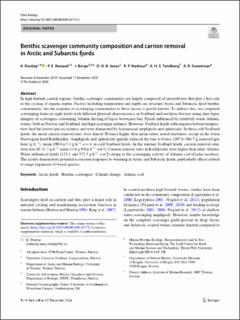| dc.contributor.author | Dunlop, Katherine Mary | |
| dc.contributor.author | Renaud, Paul Eric | |
| dc.contributor.author | Berge, Jørgen | |
| dc.contributor.author | Jones, Daniel O.B. | |
| dc.contributor.author | Harbour, Rob P. | |
| dc.contributor.author | Tandberg, Anne Helene S. | |
| dc.contributor.author | Sweetman, Andrew K. | |
| dc.date.accessioned | 2021-02-16T11:27:14Z | |
| dc.date.available | 2021-02-16T11:27:14Z | |
| dc.date.created | 2020-12-18T10:38:56Z | |
| dc.date.issued | 2020-12 | |
| dc.Published | Polar Biology. 2020, 1-13. | |
| dc.identifier.issn | 0722-4060 | |
| dc.identifier.uri | https://hdl.handle.net/11250/2728342 | |
| dc.description.abstract | In high latitude coastal regions, benthic scavenger communities are largely composed of invertebrates that play a key role in the cycling of organic matter. Factors including temperature and depth can structure Arctic and Subarctic fjord benthic communities, but the response of scavenging communities to these factors is poorly known. To address this, we compared scavenging fauna in eight fjords with different physical characteristics in Svalbard and northern Norway using time-lapse imagery of scavengers consuming Atlantic herring (Clupea harengus) bait. Fjords influenced by relatively warm Atlantic waters, both in Norway and Svalbard, had high scavenger richness. However, Svalbard fjords with negative bottom temperatures had the lowest species richness and were dominated by lysianassoid amphipods and ophiuroids. In these cold Svalbard fjords, the mean carrion removal rates were almost 20 times higher than mean values noted elsewhere, except in the warm Norwegian fjord Kaldfjorden. Amphipods and ophiuroids quickly reduced the bait to bones (207.6–304.7 g removed per hour (g h−1); mean 290.6 ± 7.3 g h−1, n = 4) in cold Svalbard fjords. In the warmer Svalbard fjords, carrion removal rates were low (0–51.5 g h−1; mean 14.6 ± 9.0 g h−1, n = 5). Carrion removal rates in Kaldfjorden were higher than other Atlantic Water influenced fjords (132.1 and 372.5 g h−1, n = 2) owing to the scavenging activity of Atlantic cod (Gadus morhua). The results demonstrate potential ecosystem responses to warming in Arctic and Subarctic fjords, particularly effects related to range expansion of boreal species. | en_US |
| dc.language.iso | eng | en_US |
| dc.publisher | Springer | en_US |
| dc.rights | Navngivelse 4.0 Internasjonal | * |
| dc.rights.uri | http://creativecommons.org/licenses/by/4.0/deed.no | * |
| dc.title | Benthic scavenger community composition and carrion removal in Arctic and Subarctic fjords | en_US |
| dc.type | Journal article | en_US |
| dc.type | Peer reviewed | en_US |
| dc.description.version | publishedVersion | en_US |
| dc.rights.holder | Copyright The Author(s) | en_US |
| cristin.ispublished | true | |
| cristin.fulltext | original | |
| cristin.qualitycode | 1 | |
| dc.identifier.doi | 10.1007/s00300-020-02773-5 | |
| dc.identifier.cristin | 1861460 | |
| dc.source.journal | Polar Biology | en_US |
| dc.source.pagenumber | 31-43 | en_US |
| dc.identifier.citation | Polar Biology. 2021, 44, 31-43. | |
| dc.source.volume | 44 | en_US |

